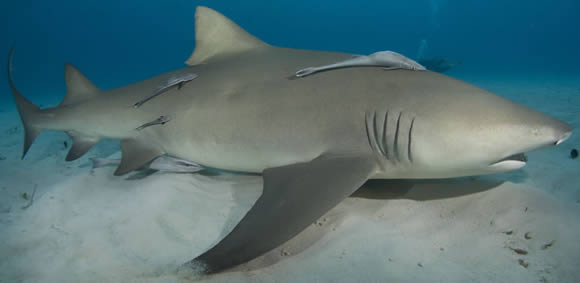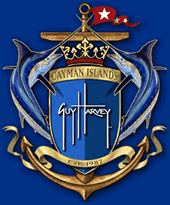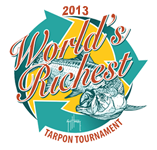 Photo provided by Andy Murch ©
Photo provided by Andy Murch ©
Article By: DANA SANCHEZ
Assistant Englewood Editor, The Sun-Herald & The Sun Coast Media Group
Lemon Sharks Prohibited for Commercial, Recreational Fishing
Lemon sharks are off limits to recreational and commercial fishermen in Florida waters thanks to a new rule that aims to save the species from extinction.
The Florida Fish and Wildlife Conservation Commission has prohibited harvesting of lemon sharks within nine miles of Gulf shores and three miles of shores on the state's Atlantic side. The sharks congregate in South Florida waters and are considered important to the state's dive charter industry.
Until now, the bag limit was one shark per person, per day, or two per boat.
During late winter and early spring, lemon sharks congregate in shallow water to mate, making them vulnerable to harvesters, according to Lee Schlesinger, an FWC spokesperson in Tallahassee
Recent data shows at least 7.5 percent of tagged adult lemon sharks from a Southeast Florida congregation died from harvesting in one season. At that rate, they could be wiped out in a few years, Schlesinger said.
"This is not one of our marquee species like snook," Schlesinger said. "It's a small species: 7 to 10 percent for a few years and the fishery's gone."
Lemon sharks are not prolific breeders. They reach sexual maturity at 12 to 15 years. Juveniles have a 40-to-60 percent chance of survival. Once over-fished, it takes decades or centuries for them to recover.
"If they're exploited, they should be exploited wisely," said Robert Hueter, director of the Center for Shark Research at Mote Marine Laboratory in Sarasota.
Hueter has been working with fishermen for decades, trying to educate them on the responsible way to fish for sharks.
In the past, he's had to fight the blood lust that shark tournaments count on for profits, he said.
"In the past, the emphasis has been on a big spectacle back at the dock, hauling these big sharks in and weighing them with blood coming out of their mouths, celebrating the killing of the great beast," he said. "It's promoted the wrong message to the public that it's OK to kill them for sport."
More shark species have been added to a prohibited list in recent years, with new size limits in state and federal waters, according to Schlesinger. The lemon shark prohibition stems from fears that regulations on other shark species could prompt fishermen to start targeting them.
"It's called effort shifting," Schlesinger said.
Hueter said he's made progress deputizing fishermen as field biologists to take data and tag the sharks they catch before releasing them.
But across the board, results are mixed, he said.
"In the last four, five years, it seems kill tournaments are coming back in some places," he said.
Sean Paxton and Brooks Paxton II of North Port participated in workshops leading to the FWC ruling on lemon sharks.
Known as The Shark Brothers, they are organizing the Guy Harvey Ultimate Shark Challenge, an all-release tournament planned for April 30. Participants will combine sports, science and conservation during the tournament which, they say, is being touted as the new gold standard for responsible, competitive shark fishing.
Research teams will work with anglers, tagging and measuring sharks boat-side. Certain species will be candidates for satellite tracking. A new approach of live streaming video from the boats back to the marina on big screen TVs eliminates the need for a bloody weighing-in, the brothers say.
The grand championship for the tourney will be held in May at Mote.
"As lifelong recreational anglers, we're also advocates for sustainability of our natural resources, sharks in particular," Sean said.
Mote's Hueter backs up the gold standard claims.
"These guys solved the problem of taking away the weigh-in site and the spectacle," Hueter said. "It changed the whole balance of the terms of running a tournament and made for something that's going to be exciting but highly environmentally sensible. And not a single shark killed."
E-mail: danchez@sun-herald.com
View Article Online
 Monday, July 25, 2011 at 02:25PM
Monday, July 25, 2011 at 02:25PM  Brooks Paxton II,
Brooks Paxton II,  Captain Robert Moore,
Captain Robert Moore,  Center for Shark Research,
Center for Shark Research,  Circle Hooks,
Circle Hooks,  Conservation,
Conservation,  Guy Harvey,
Guy Harvey,  Guy Harvey Ultimate Shark Challenge Tournament & Festival,
Guy Harvey Ultimate Shark Challenge Tournament & Festival,  Jaws,
Jaws,  Jaws Movie,
Jaws Movie,  Mote Center for Shark Research,
Mote Center for Shark Research,  Mote Marine Laboratory,
Mote Marine Laboratory,  Natural Resource Laws & Policy,
Natural Resource Laws & Policy,  News,
News,  Peter Benchley,
Peter Benchley,  Robert E. Hueter,
Robert E. Hueter,  Sean Paxton,
Sean Paxton,  Shark Fishing,
Shark Fishing,  Shark Research,
Shark Research,  Shark Tagging,
Shark Tagging,  Shark Tournament,
Shark Tournament,  Sharks,
Sharks,  Teams,
Teams,  The Guy Harvey Ultimate Shark Challenge,
The Guy Harvey Ultimate Shark Challenge,  The Media,
The Media,  Tournament News,
Tournament News,  USC Certified Shark-Release Observer Program,
USC Certified Shark-Release Observer Program,  USC Observer Program,
USC Observer Program,  Wendy Benchley
Wendy Benchley 












